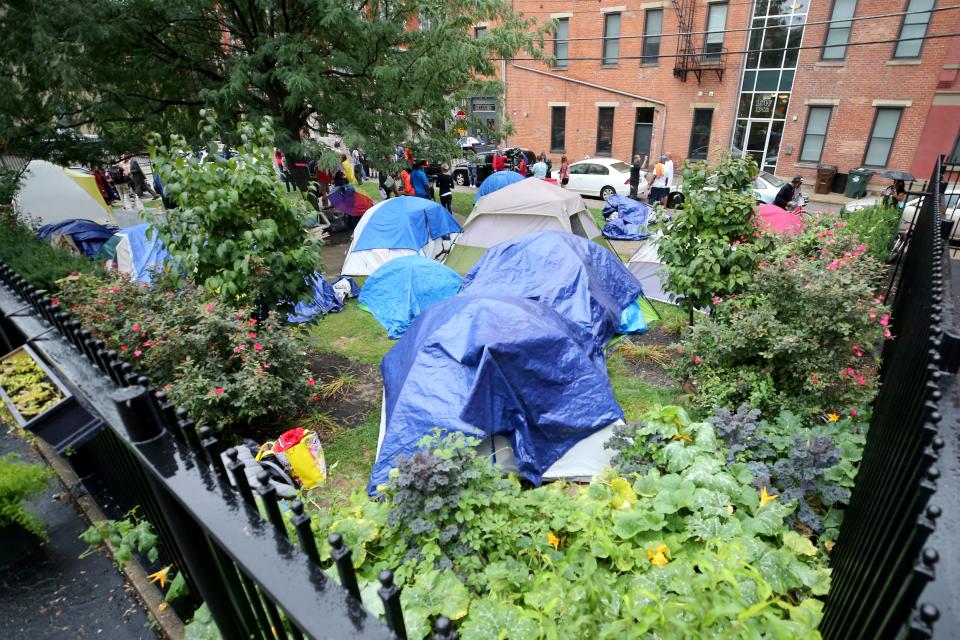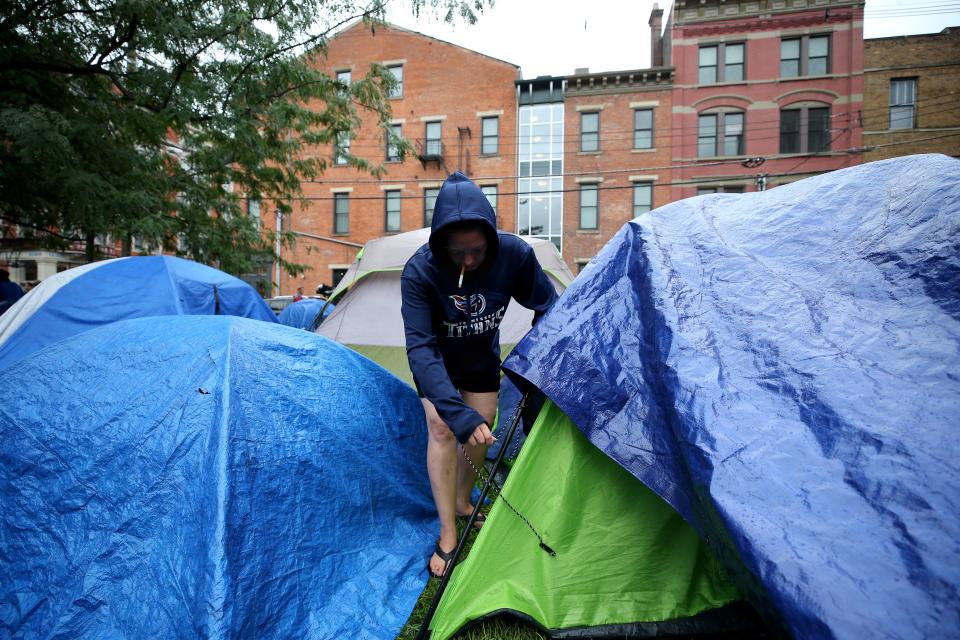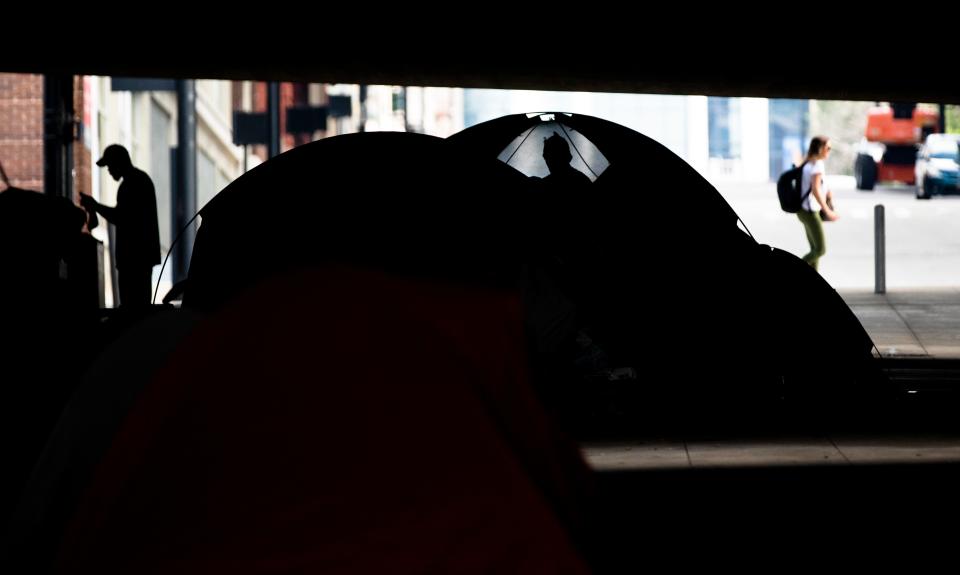'Measure of a just society': Cincinnati settles 2018 tent city lawsuit
Six years ago, the city of Cincinnati forced Patrick Chin and dozens of people who were living in a tent camp downtown out of what they considered their homes.
The move opened a debate about how people without shelter are treated and sparked two lawsuits, including one in federal court that concluded earlier this month. The city settled with Chin and the Greater Cincinnati Homeless Coalition for $83,000.

The settlement led to a new written police policy for "interaction with individuals residing in homeless encampments," aimed at better treatment of people who are experiencing homelessness.
"The city recognizes that imposing criminal penalties for sitting, sleeping or laying on public property against individuals experiencing homelessness who cannot access shelter is prohibited by the Eighth Amendment," the city's new policy reads. The Eighth Amendment bans cruel and unusual punishment.
"It's about ensuring the rights of people experiencing homelessness are protected," said Josh Spring, executive director of the homeless coalition. "This was not about the money, although I can’t speak for Patrick because I’m sure it will be helpful to him."
Chin, who was homeless when he joined the lawsuit as a plaintiff, could not be reached for comment. Spring said he is in the process of gathering people who had been living on Third Street in 2018 before he puts out information more broadly about the settlement. He does not know where Chin is living right now.
During the case, U.S. District Judge Timothy Black issued an order allowing most of the lawsuits' claims to proceed, saying: "The measure of a just society is how it treats its most vulnerable members. One can have a good debate on how to do that properly, but let us agree that it must be our goal."
Revised encampment intervention policy
The agreement comes under an entirely new city council, mayor and police chief, compared to 2018.
The Enquirer obtained the settlement through a public records request.
The biggest changes: City policy now says that before there can be police involvement with a homeless encampment, an outreach service provider must have engaged with individuals living in the encampment and shelter space must be available and offered. The prior policy said when a complaint about an encampment was made, it would be referred to a police supervisor.
If, under the new policy, both those things happen and a person refuses to move, a trespassing citation can be issued.
Potentially criminal violations like illicit drug use or physical assault can be addressed immediately by police.
Downtown resident: 'A very strange solution'
Sue Byrom, vice president of the Downtown Residents Council, who worked with police on the issue in 2018, expressed concern about the new policy.
"I do sympathize with people who are homeless," Byrom said. "But I find it a very strange solution."
Encampments should not be permitted, she said.
Byrom, who was the president of the Downtown Residents Council in 2018, made multiple complaints back then about homeless camps near busy streets and worked with police to help people living in the encampments find shelter.
She recalled some of the homeless people harassing Downtown visitors and said she worried the new policy would lead to the re-creation of homeless camps.
City manager: 'Holistic solutions' goal of encampment response
City Manager Sheryl Long told council last year during her review process that handling encampments humanely was important to her.
"The city has diligently worked to reorient its response to homeless encampments," she said. The city now has what's known as a "place-based initiatives manager," a licensed social worker who responds to encampments.
The city instituted a revised workflow, Long said, "leading to more holistic solutions for encampments," she said.
Are there enough shelter beds?
Hamilton County has 10 shelters with a capacity of 675 beds year-round, said Kevin Finn, president and CEO of Strategies to End Homelessness, which leads a coordinated care system for the homeless throughout Cincinnati and Hamilton County.
Often there aren't shelter beds immediately available, and certainly not several dozen at a time. So that could mean an encampment, even one out in the open, would be allowable under the new policy, he said.
"Can everyone get in on the very first day they try? Not necessarily. But if a person wants to get in, they can," Finn said.
There are still homeless encampments in and around downtown Cincinnati, but they tend to stay out of sight, Finn said. Finn said the focus should not be on a person's right to remain homeless but instead on providing shelter.
"Why would we want anyone to be on the street?" he said. "It doesn't make any sense. Nothing but bad things happen to people when they sleep on the street."

US Supreme Court considering similar issue
The agreement comes as the U.S. Supreme Court is poised to rule on a similar case out of Grants Pass, Oregon, that involves what steps cities can take to prevent people from sleeping in public places.
The Supreme Court could find that it's cruel and unusual punishment − an Eighth Amendment violation − for cities to impose criminal penalties on people for being on public property when they can't find shelter. The Eighth Amendment was at the center of the Cincinnati case, as well.
If that happens, Spring said, "it would essentially force more communities to work with people instead of criminalizing homelessness and pushing people around."
Spring noted that the city has been doing much of what's outlined in the settlement but not always. Creating a written policy is important, he said.
Outreach statistics say that there were approximately 1,100 people living on the streets last year. That was the largest number since 2015. In 2018, when the lawsuit was filed, there were 965.
What the lawsuit said

The encampments became an issue in Cincinnati in April 2018 when the city broke up an encampment under the Interstate 71 overpass near Third and Plum streets. The camps moved throughout Downtown and Over-the-Rhine that summer, frustrating some residents and city council members, who wanted to help people, not have them living on the street.
By August of that year, then-Cincinnati Mayor John Cranley stepped in. He said the encampments were "a clear and present health and safety hazard to homeless individuals and the general public." He sought help from then-Hamilton County Prosecutor Joe Deters to shut the camps. That led to series of court orders that said anyone allowing or living in any encampment in Hamilton County could be arrested and charged with a crime.
In late summer 2018 New Prospect Baptist in Roselawn allowed the camp to move there, but the court orders were so broad that camp too was deemed illegal.
The Ohio ACLU, representing the church, sued, and the following year, a state appeals court issued a ruling that said the lower court order could not be applied to a private property owner like New Prospect or in areas of Hamilton County outside the city of Cincinnati.
But the federal case involving the city's policy continued until the recent settlement.
This article originally appeared on Cincinnati Enquirer: Cincinnati settles 2018 civil rights tent city lawsuit

